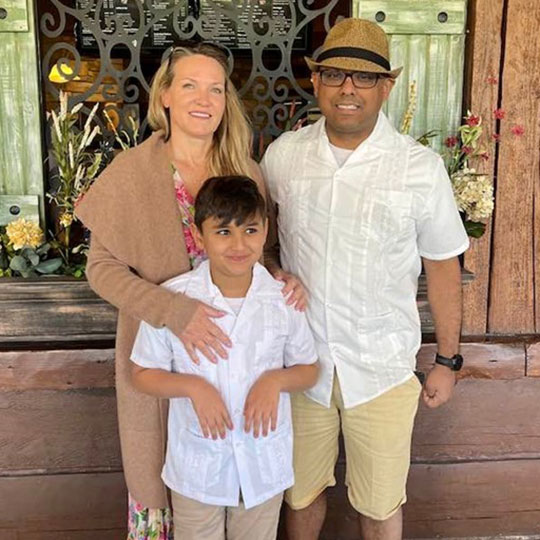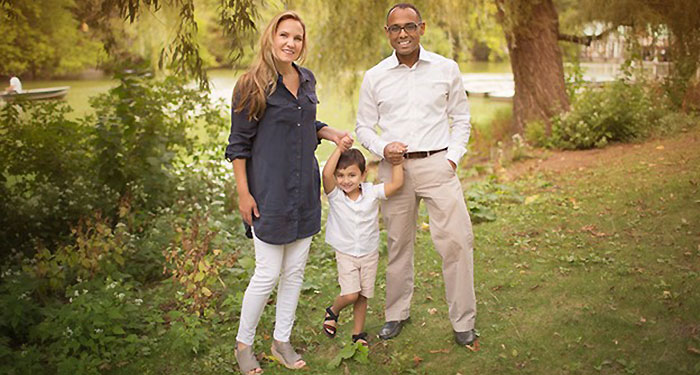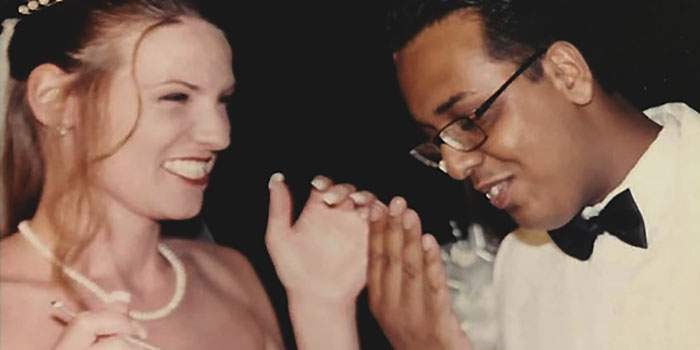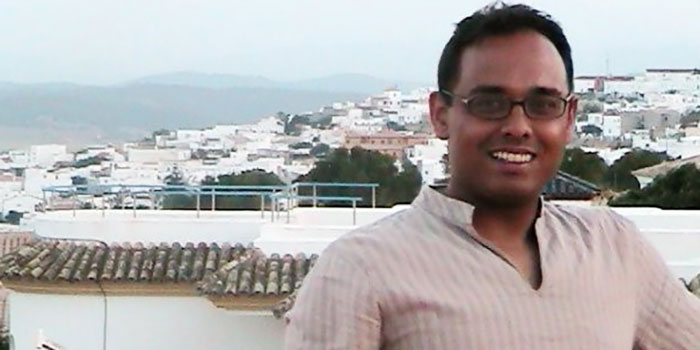


After his mother died of breast cancer when he was just 5 years old, Dr. Ajaz Khan went on a quest to find the many answers to the question, “Why?”
Why?
Few questions are so simple, yet so difficult to answer.
For Dr. Ajaz Khan, finding answers to the many whys in his world has been a driving force in his life.
Why, looking at his mother through 5-year-old eyes, did she have a cervical collar around her neck?
Why couldn’t she get out of her wheelchair to play with him?
Why did his patient, a talented cellist, develop lung cancer when she had never smoked?
His quest to understand why, whether in response to life’s existential puzzles, through scientific inquiry or out of basic curiosity, is driven by a deep empathy and compassion for people. It has propelled Dr. Khan’s life and career and ultimately led him to City of Hope Chicago, where he serves as Medical Oncologist and Chair of the City of Hope Department of Medical Oncology.
Driven by his mother’s passing, his caring family and perspectives shaped from his travels around the world, Dr. Khan melds his personal experiences with his medical skills and business acumen to serve his patients and the City of Hope enterprise.
“Every day when I see patients, I ask, ‘How can I best serve them?’ Part of that is looking for innovative treatments … new opportunities, new possibilities to provide the best cancer care we can for patients,” he says.
Early childhood memories are often made of snippets and shadows of people, places and events. Some of Dr. Khan’s earliest memories are of a mother terminally ill with cancer. At age 31, she was diagnosed with breast cancer. She passed away three years later when Dr. Khan was just 5 years old.
“I knew my mom, but I never really could engage in any activity with her because she was so sick,” he says. “She was not really involved in my day-to-day life. Obviously, when you’re 5, you really don’t know what’s happening, right? You just know that something’s not right.”
His grandmother and his mother’s younger sister came to live near Dr. Khan and his father in New York City to help his mother and to care for him as a young child.
“It was kind of a unique arrangement because my parents were in one condo, and then my grandma, my uncle and my aunt were living in a separate condo,” he recalls. “So, we were literally like two buildings apart. My aunt would come pick me up from school, and my grandma was there to take care of me. I’d see my dad when he got home after work.”

The memories of how his mother’s illness shaped his day-to-day life as a child have given Dr. Khan a unique empathy for other families in a similar situation, leading him to continually consider the whole family when discussing treatment options.
“There are obviously other physicians who I’ve talked to over the years who had similar experiences to this, and it kind of shapes you in terms of the reality of what’s happening. You kind of assume it’s the norm because you don’t know any better,” he says. “But then, you have to ask yourself, ‘What can I do to make things better every day? How can I improve people around me? How can I improve the environment I’m in? What can I do as a human being every day to make life better for everyone around me?’”
For Dr. Khan, the answers to those questions took shape over the following years as his father remarried and the family left New York to live overseas for several years.
His father, a financial consultant, took a job in France, where the family lived for two years. There, beginning at age 8, Dr. Khan learned to speak French and to adjust to and gain an appreciation for a foreign culture.
“I think it’s really interesting and fascinating, from the health care aspects to just day-to-day life. It’s so different,” Dr. Khan muses. He laughs recalling the time when he and his wife visited Paris years later. At a restaurant in Montparnasse, on Paris’ Left Bank, he left to use the restroom, and in his absence, his wife—who doesn’t speak French and was unfamiliar with French culture—ordered “steak” from the menu, expecting an American version, only to be dismayed to find out it was steak tartare, which is raw beef.
“That’s part of life,” Dr. Khan chuckles. “You have to see how the other half lives.”
Thanks to his father’s job, Dr. Khan was also exposed to other areas of the world as a young man, living for a time in Israel and the Middle East before the family ultimately settled in California, where Dr. Khan spent his teen years before leaving for college at the University of North Carolina.

The depth of his curiosity—both scientific as well as in the humanities—inspired Dr. Khan to double major in history and biochemistry.
After graduation, he decided working toward a PhD as a research scientist was the best way to understand “why” while finding cutting-edge strategies to help people.
“I wanted to do research and publish papers and do that kind of thing. Right after graduation, I ended up working in a lab that was on the UC Berkeley campus and got paid as much as the lab rats were getting paid,” he says with a laugh.
Impressed by his work, the German company, Bayer Corporation, asked him to join its emerging biotechnology unit to help in the development of new drugs.
“They asked me if I wanted to go to Germany and live in Germany, and they’d provide housing for me. So, I said, ‘Yeah, absolutely,’” he recalls. “I had a great experience living there and working as a scientist.”
During his time in Germany in the late 1990s, he worked on a team investigating and developing a hemophilia drug that’s commonly used today, while also helping to research and develop several other federally approved medications. Dr. Khan remembers that time as “fantastic.”

In Europe, unlike in the United States, pharmaceutical research involves more interaction with patients using the experimental drugs during clinical trials, Dr. Khan says.
“It’s very common in these European countries, at least in the 1990s, that you get to meet the physicians, that you get to have interactions with patients,” he says. “That really kind of influenced me toward becoming a physician and caring for patients rather than producing medications or drugs.”
So, Dr. Khan took his knowledge as a research scientist with him to medical school to learn how to treat and help patients directly. He acknowledges that his mother’s experience also had a role in his career choice.
“My mom’s death has been an overwhelming theme for me in my life,” he says. “It kind of shaped my decision to go to medical school.”
It also prompted him to specialize in oncology.
“Seeing my mom and what she went through and that so much had not been discovered yet influenced my decision,” he says. “There’s so much potential for discovery and so much potential to touch patient lives as an oncologist.”
Dr. Khan attended medical school at St. George’s University in Grenada, West Indies, and, following his subsequent fellowship in hematology and oncology at Newark Beth Israel Medical Center in Newark, New Jersey, a mentor saw great leadership potential in him and encouraged him to pursue a Master of Business Administration (MBA) degree.
“When you’re just out of fellowship, you have no idea how to lead doctors. They don’t teach you this in medical school. It’s just part of the experience in life you have to learn,” he says.
Dr. Khan earned his MBA with top honors from George Washington University School of Business in Washington, D.C.
“For me, what motivated me to get an MBA was a deep desire to influence care around me,” he says.
Now, in his multiple roles at City of Hope, Dr. Khan strives to apply his medical, business and leadership skills to help improve patient care, which, he says, is a priority above all else. He recalls the advice of a fellow physician and friend as he launched his career as a physician leader: “Be sure to always see patients, man.” Dr. Khan has taken that to heart, continuing to treat patients as he also works to build and strengthen a business model to support physicians.
Years removed from his mother’s death, Dr. Khan continues to search for the answer to the question, “Why?”
Shaped by his academic and professional accomplishments as well as his life experiences, Dr. Khan strives to bring a deep personal understanding and compassion to patients while delivering comprehensive, personalized treatment options. His own perspectives gained from living abroad—as well his fluency in French and Urdu—often help him make meaningful connections with his patients.
“If you really put yourself in the patient’s shoes or in their families’ shoes and look for the best potential treatments, you’ll often come out on top. That’s the overarching theme or mission in what we have to do in terms of caring for patients,” he says, adding that his own memories and experiences help contextualize his perspective.
Recently, he was able to help a woman, a cellist who was diagnosed with lung cancer, although she had never smoked.
“She was very concerned about getting chemotherapy, which would cause neuropathy in her hands,” Dr. Khan says. “We gave her a round of chemotherapy, then we investigated her tumor, and sure enough, it was one we could easily treat with a small molecule drug. Low and behold, six months later, 85 percent of the disease is gone. Those are the stories that really make you feel enriched, that really make you feel you’re making a difference.”
Dr. Khan realized early in his career, when he was seeking his first job after his fellowship while traveling around the country for interviews, that the quest to understand why and make a difference never ends.
“What I really learned about myself was that, essentially, you can’t stop searching, and you can’t stop educating yourself. And, more importantly, you always have to work toward improving yourself every single day,” he says. “The more life experiences you have, the more you can share and the more commonalities you have with people.”
The journey to understanding why and to put answers into action is continuous. Looking back, Dr. Khan’s path so far has been a winding one, but consistent in striving toward compassionate service to as many people as possible.
“Rather than one unifying event, it’s all these little events that occur along the way,” he says. “You have to follow the tea leaves or guideposts that lead you to where your life is gravitating.”